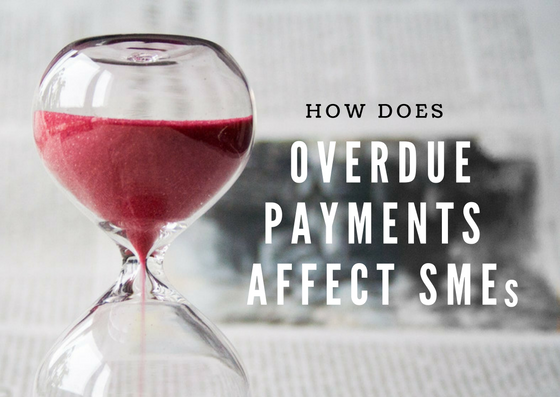
How Does Overdue Payments Affect SMEs
In 2017, Sage published a study on the effects of overdue payments on Small and Medium Enterprises (SMEs) – “Domino Effect: The Impact of Late Payment”. The study was conducted over 3000 companies across 11 countries. The purpose of this study is to understand the scale of the issue, the way overdue payment affects companies and to identify possible solutions to reduce the problem.
Late Payment High-Level Statistic
- 11% of invoices, which equate to USD 1.01 trillion per year are paid late
- 5% of invoices are written off as bad debt
- Singapore – SGD 29 billion worth of invoices are paid late
- Singapore – SGD 15 billion are written off as bad debt

According to the research, more than 50% of SMEs in Singapore are affected by overdue payments.

1. How significant is overdue payments to SMEs in SG
Late payment has always been a significant problem for SMEs around the world. Singapore SMEs are facing the highest percentage (18%) of their invoice being paid late.

2. Who pays the invoices late?
Further research was done to find out what percentage of late payments received by SMEs was contributed by each company type. In Singapore, most of the overdue payment received by SMEs are made by other SMEs (~33%). The next large contributor to overdue payment received by SMEs in Singapore are micro companies (~16.5%) followed by Large corporations (~15%).

Majority of the overdue payment received by SMEs are made by other SMEs. This is a vicious cycle as when SMEs are paid late, this would hinder their ability to make payment to their suppliers on time due to their lack of cash flow.
3. How does overdue payment impact SMEs?
On average 39% of SMEs reported or expect impacts from late payments. In Singapore, 52% of SMEs are either experiencing some impact from overdue payment or foreseeing the upcoming challenges.

Late payments have a significant impact on SMEs in Singapore, the 2 main issues are:
3.1 Impact on cash flow.
SMEs are vulnerable to disruption to their operations as SMEs do not have the resources to cope with late payments. Cash flow is one of the major cause of operational disruption where late payment results in negative cash flow, which leads to
- Inability to pay salary, commission or bonus, resulting in low morale and poor productivity
- Inability to pay company’s expenses
- Inability to pay suppliers, resulting in a poor relationship with suppliers, inability to extend a credit line, worst suppliers may refuse to do future business
- Inability to inject investment into the company. This includes the inability to add a new product line or expand into a new area.

3.2 Opportunity Costs
SMEs are unable to take on new contract/project due to lack of cash flow.
3.3 Force SMEs to channel their precious resources in handling collection administrative tasks
SMEs are forced to reassign their precious limited resources to chase late payments from their debtor(s) instead of carrying out their day to day operations and/or sales activities. Thus, slowing down their growth.

As a result of the collection process, SMEs will also incur monetary costs. Such cost includes administrative fees, legal fees and a deduction of revenue.
In Singapore, SMEs spends almost $4,000 a year chasing late payments from their debtors. These financial costs incurred could have been channelled into other areas which could allow the business to grow.

In the absence of financing facilities, SMEs would have to tap on their cash reserves to ensure that their daily operations are able to run smoothly.
4. Reasons for late payment
Factors which causes late payments in Singapore are:
- 46% – pending payment from their customers
- 33% – no reason given
- 24% – the invoices are paid at a pre-defined periods

5. Barriers for Chasing Late Payment
The challenges that Singapore SME faces in chasing late payments are:
- 41% – to protect client relationship for future sales purpose
- 37% – no dedicated resources to manage and handle collection activities. This could be due to the SME’s inability to freely collect late payments from their customer as they need to protect their working relationship with them. Therefore, there is insufficient justification to deploy a dedicated resource to carry out collections.
- 17% – lack of resource

Cash Flow Solution to Support Late Payments
Invoice Financing is a cash flow solution that has been been widely used to help businesses smoothen their cash flow. Businesses are able to control of their cash inflow better as they now have the ability to convert outstanding invoices into cash as and when they need to. This allow businesses to meet cash outflow demand, being operating expenses, salary or paying suppliers.
References
Tim Miller, Sarongrat Wongsaroj, December 2017, Sage, “The Domino Effect: the impact of late payments“, Link
Related links
Related Articles

Boosting Your Business: Top Strategies for Improving Cash Flow

The Ultimate Guide to Receivables Financing: Boosting Your Business Cash Flow
